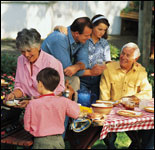Tips for a Healthy and Safe Family Reunion
 Family reunions are a time to introduce and reinforce healthy living.
Family reunions are a time to introduce and reinforce healthy living.
Family reunions are a great opportunity for safe and healthy food and activities. Enjoy family and start or pass on healthy traditions that will last for many generations.
If you are planning or participating in a family reunion, follow these tips to make sure your family reunion is safe and healthy.
Plan healthy meals, snacks, and drinks.
 Eating and exchanging recipes is a big part of family reunions. Take this opportunity to change up and adapt some of your favorite foods and beverages for healthier options lower in saturated fat, salt, and calories. As you plan and prepare healthy meals, make sure to consider food safety to avoid harmful foodborne bacteria. Be especially careful when preparing food for children, pregnant women, those in poor health, and older adults.
Eating and exchanging recipes is a big part of family reunions. Take this opportunity to change up and adapt some of your favorite foods and beverages for healthier options lower in saturated fat, salt, and calories. As you plan and prepare healthy meals, make sure to consider food safety to avoid harmful foodborne bacteria. Be especially careful when preparing food for children, pregnant women, those in poor health, and older adults.
- Cook: Cook meat, poultry and eggs thoroughly.
- Separate: Don't cross-contaminate one food with another.
- Chill: Refrigerate leftovers promptly.
- Clean: Wash hands, produce, cutting boards, utensils, and countertops.
- Report: Report suspected foodborne illnesses to your local public health department.
Stay safe outside.
 Take extra safety precautions to make sure family and friends are safe during indoor and outdoor activities. This includes wearing appropriate safety gear, leaving fireworks to the professionals, avoiding heat-related illness, and practicing sun and water safety.
Take extra safety precautions to make sure family and friends are safe during indoor and outdoor activities. This includes wearing appropriate safety gear, leaving fireworks to the professionals, avoiding heat-related illness, and practicing sun and water safety.
- Beware of bugs. To prevent illnesses such as Lyme disease and other serious infections, use an appropriate insect and tick repellent. Prime mosquito-biting hours are usually dusk to dawn, but ticks are out at all times.
- Swim safely. Swimming is a fun activity for people of all ages and offers numerous health benefits; however, recreational water (water from pools and hot tubs) can also spread germs that cause illnesses known as recreational water illnesses (RWIs). Healthy Swimming behaviors will help protect you and your kids from recreational water illnesses (RWIs) and help stop germs from getting in the pool in the first place.
- Beat the heat. Getting too hot can make you sick. The main things affecting your body's ability to cool itself during extremely hot weather is high humidity and personal factors such as age, obesity, fever, dehydration, heart disease, and mental illness, as well as a host of others. Learn more about heat-related illness and how to stay cool and well in hot weather.
- Got water? Don't wait until you feel thirsty to drink water; the human body needs fluids on a regular basis. Dehydration occurs when the body loses water faster than it should. During times of extreme heat or extreme exertion, be alert for signs of dehydration. Symptoms include a decrease in urination, a dry mouth and throat, and feeling dizzy when standing up.
- Protect your skin. When you're having fun outdoors, it's easy to forget how important it is to protect yourself from the sun. Unprotected skin can be damaged by the sun's ultraviolet (UV) rays in as little as 15 minutes. While you enjoy the outdoors this summer, protect yourself from skin cancer by seeking shade, wearing sunglasses, a hat, and sun-protective clothing, and using sunscreen.
Know and share your family health history.
 Family health history is an important risk factor for common chronic diseases such as cancer, heart disease, and diabetes. Since your family will be together, use this time to talk about family health. Let members know about health issues that are common in the family. Incorporating healthy foods, physical activity, and preventing illness and injury into your reunion plans are a great way for the entire family to stay healthy.
Family health history is an important risk factor for common chronic diseases such as cancer, heart disease, and diabetes. Since your family will be together, use this time to talk about family health. Let members know about health issues that are common in the family. Incorporating healthy foods, physical activity, and preventing illness and injury into your reunion plans are a great way for the entire family to stay healthy.
Be sure to check out My Family Health Portrait and enter your information.
- Talk to Your Family. Write down the names of blood relatives you need to include in your history.
- Ask Questions. Find out about other relatives, both living and deceased.
- Record the Information. Write this information down, and update it from time to time.
- Share with Your Doctor. A doctor can evaluate all of the factors, including family health history, which may affect your risk of some diseases, and can recommend ways to reduce that risk.
Travel safely, and be prepared.
No matter the distance you are traveling, keep these tips in mind.
- Avoid drinking and driving.
- Make sure adults and children are buckled up in motor vehicles.
- If you're taking a cruise, check ship inspection scores and travel notices to get up to date international travel information.
- Make sure you've had all appropriate vaccinations for your destination.
Visit CDC's Travelers' Health to learn more about safe travel.
Be safe and active.
 Reunion plans can involve walking, hiking, dancing, biking, tennis, bowling, or other fun activities. Adults should get 2½ hours a week and kids should get 1 hour a day of physical activity. Include activities that raise breathing and heart rates and that strengthen muscles and bones.
Reunion plans can involve walking, hiking, dancing, biking, tennis, bowling, or other fun activities. Adults should get 2½ hours a week and kids should get 1 hour a day of physical activity. Include activities that raise breathing and heart rates and that strengthen muscles and bones.
Go green.
Reduce or prevent waste. Use products that can easily be reused or recycled. Recycle items such as glass, plastic, and paper.
More Information
- Family Reunion Health and Safety Tips
- Family Health
- Family Reunions (PSA) [PODCAST - 0:30 seconds]
- Family Reunions II (PSA) [PODCAST - 0:30 seconds]
- Family History Resources and Tools
- Family Reunions and Family Health History
- Healthy Living
- Reduce, Reuse, Recycle (EPA)
CDC works 24/7 saving lives and protecting people from health threats to have a more secure nation. A US federal agency, CDC helps make the healthy choice the easy choice by putting science and prevention into action. CDC works to help people live longer, healthier and more productive lives.
Get email updates
To receive email updates about this page, enter your email address:
Contact Us:
- Centers for Disease Control and Prevention
1600 Clifton Rd
Atlanta, GA 30333 - 800-CDC-INFO
(800-232-4636)
TTY: (888) 232-6348 - Contact CDC-INFO



